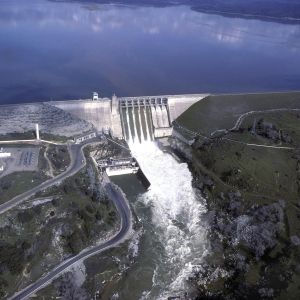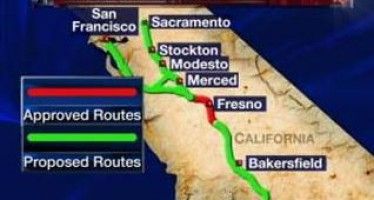CalPERS pushes CA away from cheap, clean hydropower
By Wayne Lusvardi
During the court-ordered “drought” in California from 2007 to 2010, some signs along highways in the Central Valley read:
“Food grows where water flows”
“Congress created dust bowl”
“No water=no barley=no beer”
“People are more important than fish”
Possibly by 2020, after possible rolling power blackouts and unexplainable regional power grid failures, the next signs that will appear on California’s highways will read:
“Clean hydropower keeps all energy prices low”
What this means is that all energy is “fungible”: all forms of energy are interchangeable in use but not in price. Stated differently, the availability of the lowest priced source of clean energy, hydropower, holds down the price inflation of all other forms of energy (e.g., natural gas, nuclear, geothermal, wind, and solar). Take away the lowest priced product of anything — a commodity, a manufactured good or a service — and there will be price inflation due to lack of a cheaper competitor.
Klamath River dam removals
This is precisely what California is intending to do with its pending joint plan with Oregon, the U.S. government and billionaire Warren Buffett to demolish four dams and hydropower stations. But currently there is a dry spell in Oregon and local farmers and ranchers are opposed to demolishing the dams, as reported April 19 in the Wall Street Journal.
Of course, demolition of the dams will immensely help overpriced Green Power compete in California’s rigged energy marketplace. Green Power is wind, solar and geothermal power.
And it will mean that, during the next energy crisis, highly unpredictable Green Power may have to be relied upon instead of hydropower from the Pacific Northwest.
But why would California be so seemingly irrational to block the cheapest and cleanest form of energy: flowing water that creates energy that can be captured and turned into electricity by driving the water wheel of a turbine engine?
Cal pension system dependent on green power monopoly
One reason hydropower is embargoed from the California energy market is that The California Public Employees System is betting that investments in overpriced Green Power will be able to bail out its ailing pension fund. In other words, electricity ratepayers will pay for higher public pensions through their utility bills, rather than by direct taxes. And cash-strapped cities won’t have to get voter approval under Proposition 13 for tax increases to pay for the pensions.
California’s looming power crisis
Californians have short memories. They forget that one of the contributing factors to the state California Electricity Crisis of 2000-01 was a drought in the Pacific Northwest resulting in a lack of availability of hydropower. Cheap hydropower was unavailable for the California energy market just as old, polluting fossil fuel power plants along the coast were being decommissioned to comply with federal clean air mandates by 2001. California was running out of clean sky and cheap power in 2001. But the Electricity Crisis was falsely blamed on the bogeymen of “Enron” and “deregulation.”
CalPERS’ and the State legislature’s rigging of the energy market under AB 32, the Global Warming Solutions Act of 2006, in favor of highly unreliable green power, is setting California up for its next energy crisis. As Davis Swan of Debarel Systems, Ltd., wrote, “Rolling blackouts and/or regional grid failures will occur on a more frequent basis. These are unavoidable consequences of continued aggressive development of renewable generation.”
Why hydropower expansion is blocked
One way to prevent the inevitable energy price inflation is to offset the loss of the hydropower from the four dams along the Klamath River with new hydropower projects. But despite that hydropower is clean and cheap, AB 32 does not consider hydropower as “green.” Once the principle of “fungibility” described above is understood, anyone can see why hydropower doesn’t count to meet Green Power requirements. If solar farms, wind farms, and geothermal power plants had to compete in price with hydropower, they would go out of business.
Countering the rigged energy market against hydropower, on April 10 the U.S. House of Representatives passed the Bureau of Reclamation Small Conduit Hydropower Development and Rural Jobs Act, H.R. 678, by a vote of 416 to 7. Even California Democrat Jim Costa, D-Fresno, joined Tom McClintock, R-Elk Grove, in co-sponsoring the bill.
Power failures
Swan explained the reason we are destined to future power system failures is, “[W]e just have to learn things the hard way!” He doesn’t seem to grasp that it is California’s huge pension fund gap that is pressing CalPERS and the state Legislature to rig California’s energy market against both the cheapest and cleanest form of power available, hydropower.
California radio host Warren Duffy asks: Why enforce AB 32 when studies show there is no global warming? The explanation for why California’s environmental and energy policies are so economically and environmentally irrational can be found by “following the money” to CalPERS’ and the state legislature’s rigging of California’s energy market in favor of green investments.
Related Articles
Will High Speed Rail Ever Get on Track?
AUG. 19, 2010 Last month I had the privilege of riding the best train in California. Indeed, it’s perhaps the
Ruling that CA high court upheld hardly favorable to bullet train
I talked to a couple of insider types Thursday who asked me to explain my take on Wednesday’s California Supreme
Growth controls, not Prop. 13, produced state deficits
Jan. 7, 2013 By Wayne Lusvardi It is not Proposition 13 or greedy bankers, but the many layers of growth




